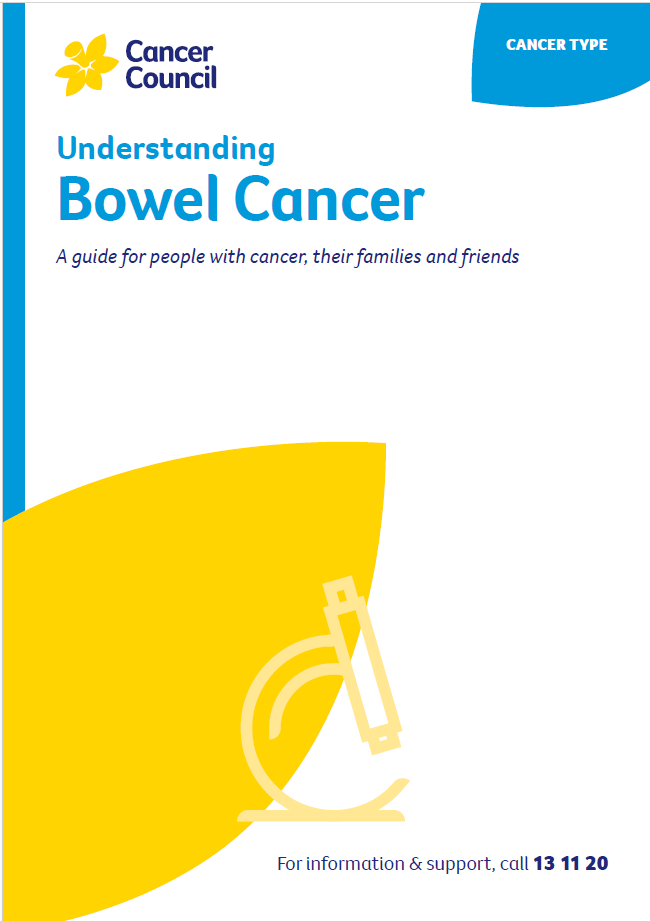- Home
- Bowel cancer
- Treatment for early bowel cancer
Treatment for early bowel cancer
This section covers treatment for stages 1–3 bowel cancer. Your health care team will recommend treatment based on what will give you the best outcome, where the cancer is in the bowel, whether and how the cancer has spread, your general health, and your preferences.
Colon cancer and rectal cancer are treated differently. The treatments you are offered will depend on the guidelines for best practice in treating bowel cancer. You may have more than one treatment and treatments may be given in different orders and combinations.
Read about treatment options for advanced bowel cancer.
Learn more about:
- Treatment options by type of bowel cancer
- What to do before treatment
- Making treatment decisions
- Surgery
- Radiation therapy
- Chemotherapy
Treatment options by type of bowel cancer
Colon cancer |
Rectal cancer |
|
|
Preparing for treatment
Talk with your doctors about whether you need to do anything to prepare for treatment. This is known as prehabilitation, and it may improve your strength, help you cope with treatment side effects and improve the results of treatment.
Manage anaemia
Many people with bowel cancer have anaemia or low iron levels. You may be given iron as tablets or injections to increase your iron levels and red blood cell count (haemoglobin level) before starting treatment.
Give up smoking
If you are a smoker, you will be encouraged to stop smoking before surgery. Continuing to smoke can increase the risk of complications, delay wound healing and delay your recovery after surgery. Smoking may make any side effects you have after other treatments worse. For support, call the Quitline on 13 7848.
Improve diet and nutrition
People with bowel cancer often lose weight and may become malnourished. If you are finding it hard to eat enough, a dietitian can suggest ways to change your diet to limit weight loss, reduce blockages and make having bowel movements easier. This will help improve your strength and lead to better treatment outcomes.
Avoid alcohol
Talk to your doctor about how much alcohol you drink. Alcohol can affect how the body works and increase the risk of complications after surgery, including bleeding and infections.
Begin or continue an exercise program
Exercise will help build up your strength for recovery. Talk to your doctor or physiotherapist about any precautions you should take, and the amount and type of exercise that is right for you.
→ READ MORE: Bowel cancer surgery
Podcast: Making Treatment Decisions
Listen to more episodes from our podcast for people affected by cancer
More resources
A/Prof David A Clark, Senior Colorectal Surgeon, Royal Brisbane and Women’s Hospital, QLD, The University of Queensland and The University of Sydney; Yvette Adams, Consumer; Dr Cameron Bell, Gastroenterologist, Royal North Shore Hospital, NSW; Katie Benton, Advanced Dietitian Cancer Care, Sunshine Coast University Hospital and Queensland Health, QLD; John Clements, Consumer; Dr Fiona Day, Medical Oncologist, Calvary Mater Newcastle, NSW; Alana Fitzgibbon, Clinical Nurse Consultant, GastroIntestinal Cancers, Cancer Services, Royal Hobart Hospital, TAS; Prof Alexander Heriot, Consultant Colorectal Surgeon, Director Cancer Surgery, Peter MacCallum Cancer Centre, and Director, Lower GI Tumour Stream, Victorian Comprehensive Cancer Centre, VIC; Caitriona Nienaber, 13 11 20 Consultant, Cancer Council WA; Dr Kirsten van Gysen, Radiation Oncologist, Nepean Cancer Care Centre, NSW.
View the Cancer Council NSW editorial policy.
View all publications or call 13 11 20 for free printed copies.
Need to talk?
Support services
Coping with cancer?
Ask a health professional or someone who’s been there, or find a support group or forum
Work and cancer
Information for employees, employers and workplaces dealing with cancer
Cancer information
Making cancer treatment decisions
Decision-making steps, consent and second opinions
Deciding on specialist care
How to find and choose a surgeon, oncologist or other specialist

